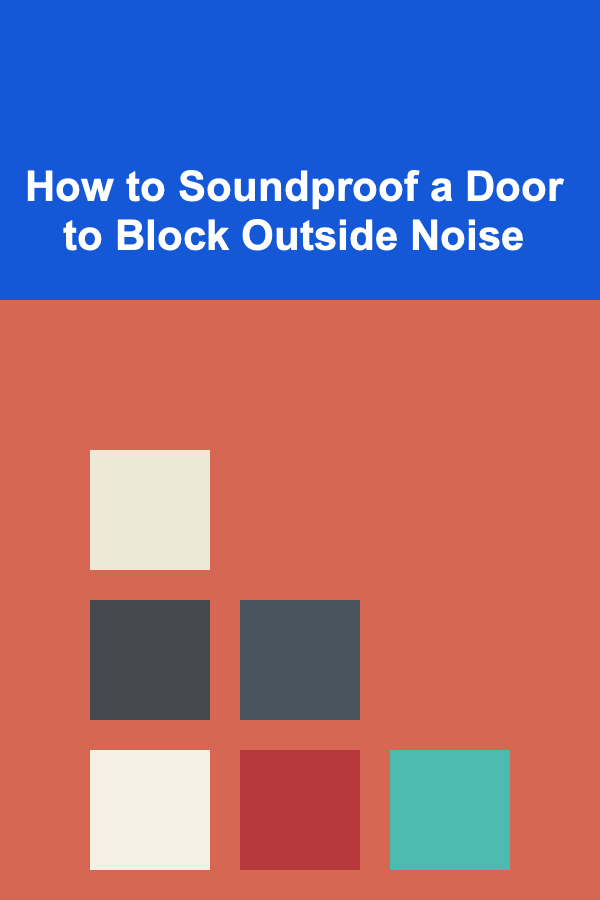
How to Soundproof a Door to Block Outside Noise
ebook include PDF & Audio bundle (Micro Guide)
$12.99$11.99
Limited Time Offer! Order within the next:

Soundproofing your door can have a significant impact on the level of noise entering your home, especially if you live in a noisy area or are looking for more peace and quiet in your living space. Whether you're trying to block out traffic, street noise, or loud neighbors, a well-soundproofed door can make your home a more tranquil place. This article delves deep into the various methods for soundproofing a door to block outside noise. From simple DIY techniques to more advanced solutions, we'll explore everything you need to know to improve your door's sound insulation and help create a quieter environment.
Why Soundproof a Door?
Before we dive into the technical aspects of soundproofing, it's important to understand why doors are often the weakest point when it comes to noise insulation. A door serves as the entry point for sound waves and, unlike walls, many doors are relatively thin and not designed to provide an acoustic barrier.
There are two main types of noise that doors can allow into your home:
- Airborne Noise: This is noise that travels through the air, such as voices, traffic sounds, or music. Airborne noise can easily travel through gaps, cracks, and thin materials.
- Impact Noise: This is caused by physical impacts, such as footsteps or furniture being moved. Impact noise can travel through the solid structure of the door.
Both types of noise can disrupt your peace and quiet, but fortunately, with the right materials and techniques, you can significantly reduce or eliminate unwanted noise from entering through your door.
Basic Concepts of Soundproofing
To understand how to soundproof a door effectively, it's essential to first grasp some basic soundproofing concepts:
Mass and Density
Soundproofing relies heavily on mass and density to block sound. The heavier and denser the material, the better it is at blocking sound. This is why thick, solid-core doors are better at soundproofing than hollow-core doors. When sound waves try to pass through a door, they are absorbed or deflected by the mass of the material.
Decoupling
Decoupling involves breaking the direct connection between the structure that generates the sound and the door. This helps prevent sound from traveling through the material. In the context of doors, decoupling can be achieved by using specialized materials like resilient channels, which create an air gap between the door and the frame.
Absorption
Absorption refers to the ability of materials to soak up sound waves rather than reflecting them. Materials like foam, fiberglass, and acoustic panels are effective at absorbing sound. By adding absorbent materials around the door, you can reduce the reflection of sound inside a room.
Sealing Gaps
One of the most important aspects of soundproofing is sealing any gaps or cracks that may allow sound to leak through. Even the smallest gap can allow a significant amount of noise to pass through. Properly sealing the edges of your door, the gaps around the door frame, and even the small cracks can make a big difference in noise reduction.
Step-by-Step Guide to Soundproofing a Door
Now that we've covered the basic concepts, let's explore the specific methods you can use to soundproof your door and block outside noise. These methods range from simple, low-cost solutions to more advanced techniques that require additional effort and investment.
1. Choose a Solid-Core Door
If you're serious about soundproofing, one of the most effective first steps is to replace your current door with a solid-core door. Solid-core doors are denser and heavier than hollow-core doors, which means they are much more effective at blocking sound.
Benefits of Solid-Core Doors:
- Increased mass: The additional mass in a solid-core door helps absorb and block sound.
- Better insulation: These doors often come with soundproofing qualities built into the design, such as a thick core material that absorbs sound.
- Improved privacy: Solid-core doors also provide better privacy since they prevent both airborne and impact noise from traveling through the door.
If replacing your door is an option, investing in a solid-core door is one of the best things you can do for soundproofing. Look for doors made from materials like wood, MDF (Medium-Density Fiberboard), or even composite materials, all of which offer excellent sound-blocking capabilities.
2. Seal Gaps Around the Door
One of the most common places for sound to leak into a room is through the gaps around the door. Even the smallest crack or gap can let a substantial amount of sound pass through. It's essential to seal all gaps around the door to achieve the best soundproofing results.
Sealing Techniques:
- Weatherstripping: Weatherstripping is a highly effective and inexpensive way to seal the gaps around your door. It is typically made from rubber or foam and can be applied along the sides and top of the door to create a tight seal.
- Door Sweeps: A door sweep is installed at the bottom of the door and prevents sound from entering through the gap between the door and the floor. There are various types of door sweeps available, including brush, rubber, and silicone sweeps. A high-quality door sweep can block both air and sound.
- Acoustic Caulk: For gaps that are too small to be sealed with weatherstripping or a door sweep, acoustic caulk is a great option. Acoustic caulk remains flexible and can be applied to cracks around the door frame or between the door and wall.
Sealing gaps may seem like a small step, but it can make a significant difference in the overall soundproofing of your door.
3. Install Soundproof Door Panels
If replacing your door or adding weatherstripping isn't enough, you can enhance your door's soundproofing by adding soundproof door panels. These panels are designed to block sound by adding extra mass to the door. They are available in various forms, such as adhesive-backed panels, hanging curtains, or removable door inserts.
Types of Soundproof Door Panels:
- Mass-Loaded Vinyl (MLV): MLV is a dense, flexible material that is highly effective at blocking sound. It can be attached directly to your door or frame to increase mass and reduce sound transmission.
- Acoustic Foam Panels: Acoustic foam panels are great for absorbing sound waves and reducing sound reflection. While they're more commonly used in recording studios, they can also be applied to doors to improve sound insulation.
- Decorative Soundproof Curtains: Heavy soundproof curtains can be hung over your door to reduce noise entering or leaving the room. These curtains are made from thick, dense materials that absorb sound.
These panels are a great option if you're looking to enhance the soundproofing of your door without completely replacing it.
4. Use Acoustic Door Seals
For a more permanent and professional solution, you can install acoustic door seals. Acoustic door seals are designed specifically to block noise and create an airtight seal around the door. They are typically used in recording studios, conference rooms, and other environments where soundproofing is crucial.
Types of Acoustic Door Seals:
- Compression Seals: These seals are made from flexible materials like rubber or silicone and compress against the door frame when the door is closed. They provide a tight seal to block sound.
- Magnetic Seals: Magnetic seals are often used for high-performance soundproofing. They work by using magnets to create a tight seal between the door and frame. These seals are typically used in doors that require an extra level of sound insulation.
Installing acoustic door seals can be a more expensive solution, but they are highly effective in soundproofing and can drastically improve the sound isolation of your door.
5. Install a Door with a Soundproof Frame
The door frame plays a crucial role in the overall soundproofing of your door. If your door frame is thin or poorly sealed, it can allow sound to leak through even if you have a solid-core door. For the best results, consider installing a door with a specially designed soundproof frame.
Soundproof Frame Options:
- Resilient Door Frames: These frames are designed to absorb vibrations and prevent sound from passing through the structure. They are often used in conjunction with soundproof doors for maximum noise reduction.
- Acoustic Door Gaskets: These are installed along the door frame and help create a tight seal around the door. Acoustic gaskets are typically made from materials like rubber, foam, or silicone, and they are excellent at blocking both airborne and impact noise.
Upgrading your door frame can be an expensive and involved process, but it's a highly effective way to maximize the soundproofing of your door.
6. Consider Adding a Secondary Door
If you're facing extreme noise levels, another solution is to install a secondary door, creating a double-door setup. This is known as a "double-door system" or "room-within-a-room" approach, and it can be especially effective for soundproofing in spaces like recording studios or home theaters.
By adding a secondary door, you create an additional barrier for sound to pass through. This approach is often used in professional soundproofing applications, but it can be adapted for residential use as well.
Conclusion
Soundproofing a door is one of the most effective ways to block outside noise and create a more peaceful and quiet environment in your home. While the process may seem daunting at first, there are many affordable and simple solutions available that can drastically improve your door's ability to block sound.
From sealing gaps and installing door sweeps to adding mass-loaded vinyl and upgrading your door frame, there are a variety of techniques you can use to achieve a quieter home. Whether you're dealing with street noise, loud neighbors, or simply want a more peaceful space, soundproofing your door can be an essential step in creating a comfortable and noise-free living environment.
By investing time and effort into soundproofing your door, you can enjoy a quieter home and an improved quality of life.
Reading More From Our Other Websites
- [Organization Tip 101] How to Use Trellises for Vertical Plant Growth
- [Tie-Dyeing Tip 101] DIY Dreamscape: Step-by-Step Tie-Dye Patterns for the Perfect Pillowcase
- [Home Holiday Decoration 101] How to Embrace Minimalist Holiday Decor for a Calm and Cozy Home
- [Home Soundproofing 101] How to Soundproof with Rubber Matting: Cost-Effective Noise Control for Floors
- [Home Storage Solution 101] How to Store and Organize Your Home's Cleaning Supplies
- [Organization Tip 101] How to Incorporate Hooks for Hanging Clothes and Accessories
- [Home Budget Decorating 101] How to Incorporate DIY Decor into Your Home Without the Stress
- [Organization Tip 101] How to Organize Reference Materials and Non-Fiction Books
- [Organization Tip 101] How to Create a Routine for Regular Equipment Maintenance
- [Home Budget Decorating 101] How to Decorate a Small Apartment Without Overwhelming the Space

How to Incorporate Personal Style into Your Renovation
Read More
How to Involve Children in Time Capsule Creation
Read More
How to Plan a Surprise Party at Home Without Giving It Away
Read More
How to Use Checklists for Streamlined Office Tasks
Read More
Zumba for Beginners: How to Learn the Basic Steps
Read More
How to Pack a Daypack for Peak Season Hiking
Read MoreOther Products

How to Incorporate Personal Style into Your Renovation
Read More
How to Involve Children in Time Capsule Creation
Read More
How to Plan a Surprise Party at Home Without Giving It Away
Read More
How to Use Checklists for Streamlined Office Tasks
Read More
Zumba for Beginners: How to Learn the Basic Steps
Read More